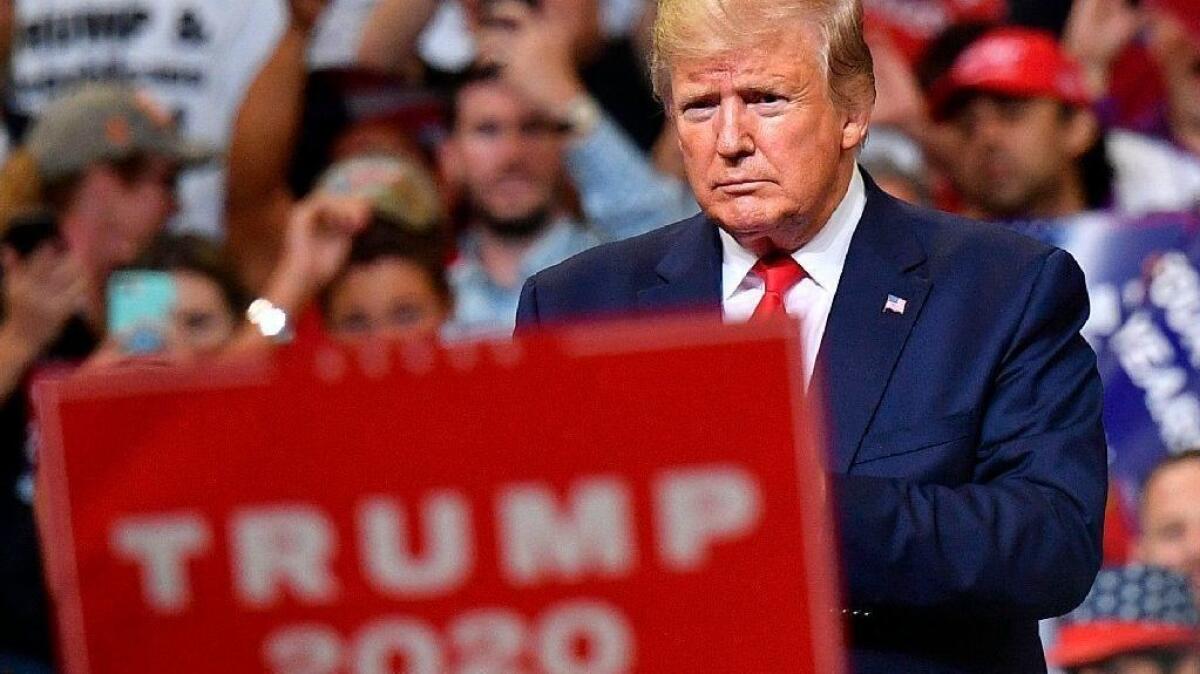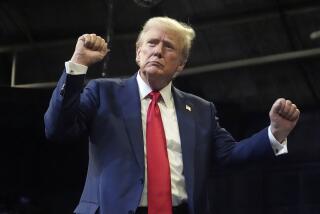Can President Trump, the most powerful man in America, successfully run as a victim?

It’s a truism of American politics that incumbents have a huge advantage over challengers when the economy isn’t heading into the dumpster. Even presidents with marginal approval ratings in their first term — Barack Obama, George W. Bush, Ronald Reagan — sailed to victory.
Why? Because as dissatisfied as Americans may be with their leaders in Washington — a dissatisfaction borne out by the repeated shifts in party control in Congress and the White House — they tend to be risk-averse when it comes to the presidency. Like a long-married spouse, they’d rather stick with someone they know even if they don’t love him anymore.
The current incumbent is riding a healthy economy, enjoying a rare combination of exceptionally low unemployment and low inflation. The endless war in Afghanistan shows glimmers of a resolution, at least for the United States. There are problems aplenty here and around the world, but there isn’t a relentless drumbeat of misery on the nightly news.
So naturally, when President Trump strode to the podium in Orlando, Fla., on Tuesday night to launch his bid for reelection, he channeled the joy and optimism of Reagan and proclaimed a glorious new morning in America.
Oh, wait. He didn’t give that speech. He gave this one.
Everything about Trump as a politician defies convention, including the very fact that he is president. So it’s fitting that he chose to open his official campaign for a second term (the unofficial campaign began the day he was inaugurated) by disdaining the road map laid out by his two-term predecessors. This won’t be an upbeat campaign that celebrates how much better we are (in Trump’s view) than we were four years ago — he’ll make that argument, of course, but more as a grace note than a recurring motif.
Instead, it will be a campaign of grievance. Specifically, Trump’s grievances about special counsel Robert S. Mueller’s investigation, the media and the congressional Democrats who stubbornly refuse to capitulate to his legislative agenda.
Four years ago, Trump won his improbable victory in part because he expressed solidarity with Americans who felt that the government had failed them — people who’d lost their jobs in industries that had globalized, or who felt threatened by the arrival of immigrants (particularly those here illegally) in their communities, or whose views of society and family structure were being challenged by seismic shifts in the legal and cultural landscape.
In Orlando, Trump focused on his own problems with the government. That’s not nearly as compelling an argument as his promise to champion the forgotten and besmirched Americans (“deplorables”) in flyover country; in fact, it’s just a reminder that Trump’s No. 1 constituency is himself.
Granted, the president tried to make his own problems seem like his supporters’ problems too, arguing that the attacks on him were actually attacks on his supporters. And that might resonate with many in Trump’s base; some Democrats never did accept the results of the 2016 election, effectively repudiating the votes cast by millions of their fellow citizens.
The problem, though, is that this approach is a buzz kill. Who really wants to hear the most powerful man in America complain about being picked on, underappreciated and stymied? The president isn’t a sympathetic underdog — he’s a leader armed with an array of tools that give him an unusual degree of control over the debate, if not necessarily the outcome.
Although the campaign is just starting, it’s unlikely Trump’s tone will change. By setting himself up as embattled, he gets to brawl verbally with his critics rather than have to lay out a policy agenda for a second term — not his strong suit, to say the least. So it’s not going to be morning in America; prize fights start at night.
Enter the Fray: First takes on the news of the minute »
More to Read
A cure for the common opinion
Get thought-provoking perspectives with our weekly newsletter.
You may occasionally receive promotional content from the Los Angeles Times.











